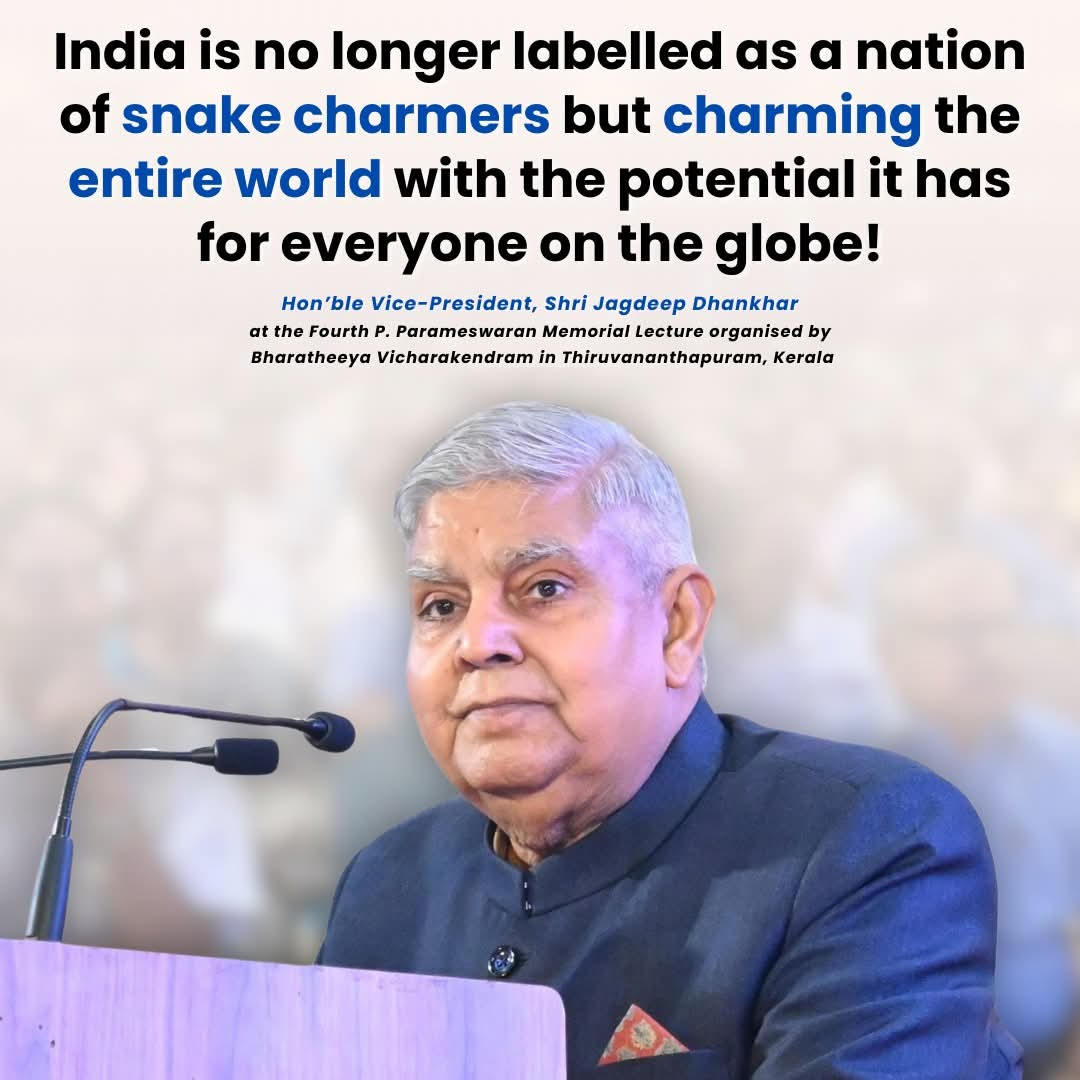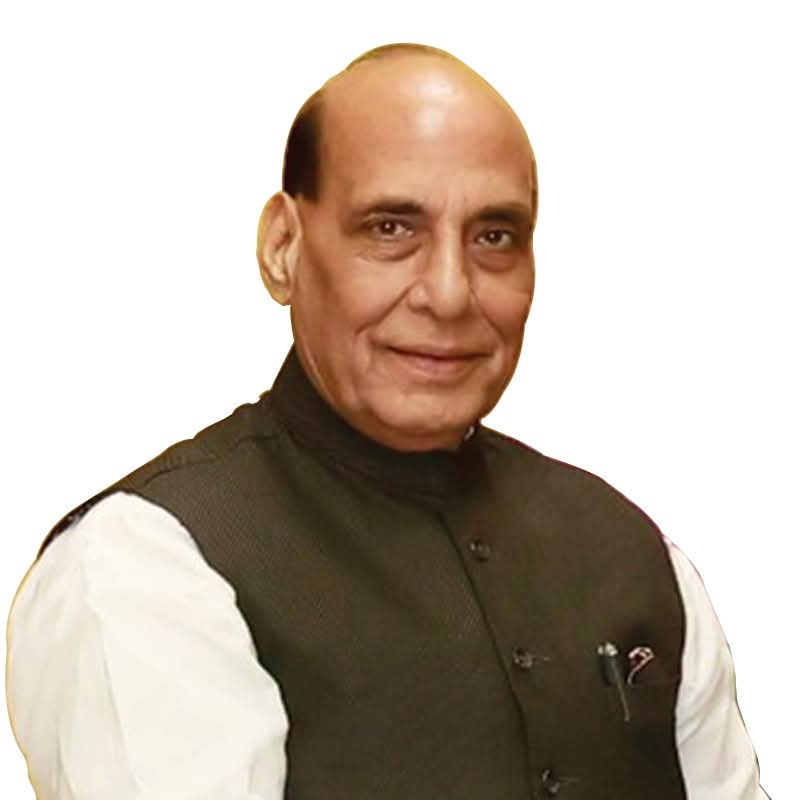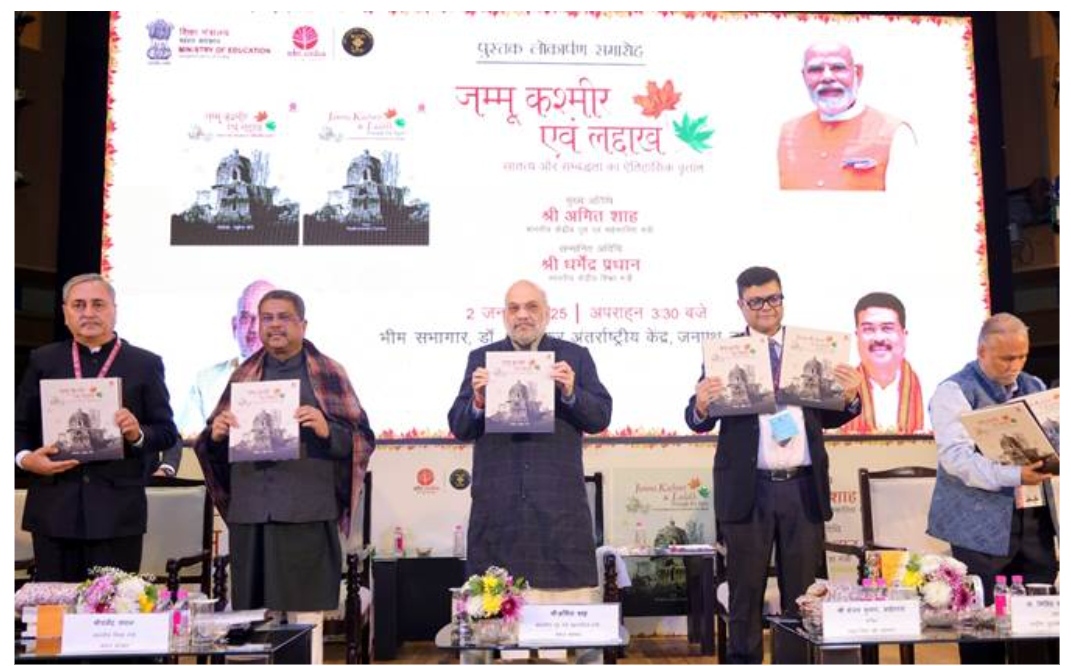India is No Longer a Nation of Snake Charmers but a Global Powerhouse, Says Vice President Dhankhar.
VP Raises Alarm Over Orchestrated Demographic Shifts, Religious Conversions, and Political Polarization in India.
Thiruvananthapuram:
In a powerful address delivered today during the Fourth P. Parameswaran Memorial Lecture at Thiruvananthapuram, Vice President Jagdeep Dhankhar emphasized India’s remarkable transformation from a country once stereotyped as a land of snake charmers to one that is now “charming the entire world” with its vast potential and growth.
In his speech, Dhankhar lauded the country’s tremendous strides over the past decade, citing people-centric policies and accountable governance as key drivers of India’s economic renaissance. He noted, “A nation of 1.4 billion people, look at the transformative change that has impacted the rural firmament… Every house has a toilet, electricity, water connections are on the way, and gas connections are being provided. Connectivity, internet access, and advancements in health and education are redefining India’s growth trajectory.”
Highlighting the inclusive nature of India’s development, Dhankhar emphasized the country’s commitment to non-discriminatory growth that benefits all citizens, irrespective of race, religion, caste, or color. “This is the essence of our Sanatana tradition—equitable development for all,” he said.
A Tribute to P. Parameswaran
During the lecture, Dhankhar also paid tribute to Shri P. Parameswaran, an intellectual and social worker who inspired generations with his deep understanding of Indian values and his commitment to national unity. He described Parameswaran as a “great son of Bharat,” whose vision for a self-reliant, culturally rooted, and spiritually awakened India continues to resonate strongly across the nation.
Concerns Over Demographic Changes
However, the Vice President raised a critical concern about what he described as “orchestrated” demographic changes in the country. He warned against “inorganic demographic transitions,” cautioning that such shifts—especially those driven by external forces aimed at altering the nation’s demographic composition—pose a threat to India’s unity and stability.
Dhankhar explained that, while demography is an essential element of a nation’s identity, such transitions should occur organically and naturally. He expressed alarm over what he sees as deliberate attempts to alter the nation’s demographic balance in a manner that could destabilize the political landscape. “We cannot have a society divided into two camps. The demographic evolution must reflect unity in diversity,” he stated. He added that the country is facing significant challenges due to the unchecked influx of illegal migrants, which, he said, not only threatens national security but also places undue pressure on employment, education, and health sectors.
Religious Conversions and Ethical Concerns
The Vice President also took a firm stand against what he described as “orchestrated, financially backed misadventures aimed at affecting conversions.” He pointed out that while India respects an individual’s right to choose their religion, attempts to convert people through allurements or coercion in times of vulnerability are unacceptable. He stressed, “When someone is in pain or need, do not use that as an opportunity for conversion. This is intolerable. Greed and temptation cannot be the basis for religion.”
Political Polarization and the Need for Dialogue
Addressing the current state of political discourse in India, Dhankhar lamented the growing polarization and divisiveness in the country. He expressed deep concern over the increasing temperature of political debates and the diminishing focus on core national values. “Politics has become alarmingly divisive, and we cannot afford to distance ourselves from the principles of inclusivity and cooperation,” he stated. He called for a return to meaningful dialogue and deliberation, particularly within Parliament, which he described as an “impregnable citadel of dialogue, debate, discussion, and deliberation.” Dhankhar expressed his anguish at the current state of parliamentary functioning, which he argued had deviated from its original purpose of transforming people’s aspirations into reality.
“The disruption and disturbance in Parliament is a sacrilege of the greatest magnitude,” he said, stressing that these actions are a direct threat to India’s democracy. He further warned against political intolerance and the promotion of partisan interests at the expense of national unity.
A Call for National Unity
In conclusion, Dhankhar urged the nation to unite against divisive forces and work together to preserve India’s civilizational values. He called for greater awareness and activism, especially among young minds and senior citizens, to foster an ecosystem that upholds the country’s ethos of unity, democracy, and inclusivity.
The event was attended by dignitaries including Dr. (Smt.) Sudesh Dhankhar, the Vice President’s spouse, R.V. Arlekar, the Governor of Kerala, and former Union Minister V. Muraleedharan, among others.



